Humans
Sign up for our newsletter
We summarize the week's scientific breakthroughs every Thursday.
-
 Neuroscience
NeuroscienceChildren’s brains shaped by music training
After two years of an enrichment program, children’s brains showed more sophisticated response to spoken syllables.
-
 Health & Medicine
Health & MedicineTrial drug improves heart failure patients’ chance of survival
Novartis’ experimental therapy LCZ696 lowers blood pressure and increases survival rates when compared with a standard drug.
By Nathan Seppa -
 Health & Medicine
Health & MedicineA hungry brain slurps up a kid’s energy
Compared with other animals, human children take their time growing up. A new study suggests that’s because kids’ brains burn a lot of energy, perhaps diverting resources from their growing bodies.
-
 Health & Medicine
Health & MedicineRemoving both breasts may not boost cancer survival
Women diagnosed with cancer in one breast who choose to have both breasts removed may not have better survival rates than women who opt for breast-conserving surgery and radiation.
-
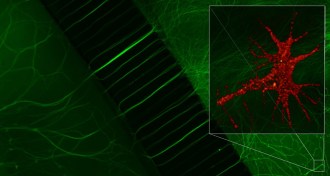 Health & Medicine
Health & MedicineRabies races up nerve cells
By hijacking a transporter protein and hitting the gas, the disease-causing rabies virus races up long nerve cells that stretch through the body, a new study finds.
By Meghan Rosen -
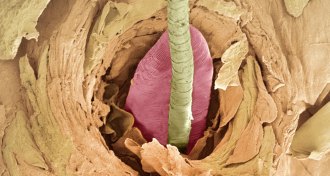 Health & Medicine
Health & MedicineTiny mites are probably crawling all over your face
Two skin mites, relatives of spiders, might populate the faces of all adult humans, according to a DNA survey.
By Nsikan Akpan -
 Life
LifeZMapp drug fully protects monkeys against Ebola virus
In a test, 18 monkeys injected with the Ebola virus and treated with an experimental drug called ZMapp survived.
By Nathan Seppa -
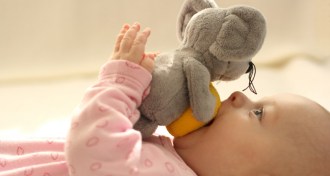 Health & Medicine
Health & MedicineBabies may be good at remembering, and forgetting
Studies in kids suggest that young children can form memories but can’t recall them later, offering new clues to how memory-storing systems form in young brains.
-
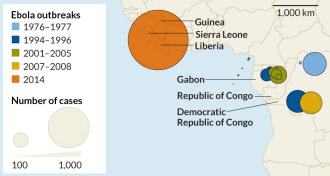 Genetics
GeneticsEbola genome clarifies origins of West African outbreak
Genetic analyses suggest that a single infected person sparked the ongoing Ebola epidemic in West Africa.
-
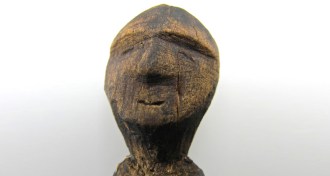 Anthropology
AnthropologySiberians came to North American Arctic in two waves
Siberian ancestors of the modern-day Inuit replaced a 4,000-year-old North American Arctic culture, a DNA study reveals.
By Bruce Bower -
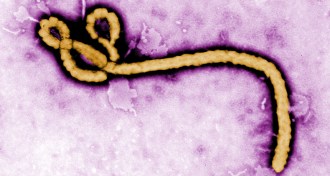 Health & Medicine
Health & MedicineHuman tests of experimental Ebola vaccine set to start
NIH and NIAID have announced that human tests of an experimental vaccine against Ebola virus will begin in early September.
By Nathan Seppa -
 Health & Medicine
Health & MedicineTo grow new knee cartilage, look to the nose
Cartilage-making cells from the nose grew into patches that successfully replaced damaged or missing cartilage in the knees of goats and of humans.
By Nathan Seppa